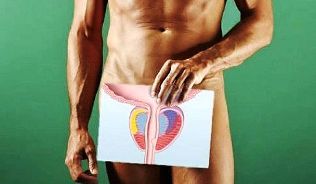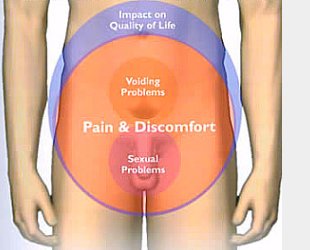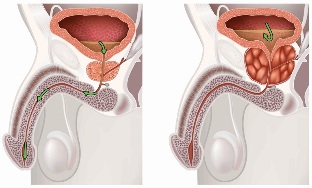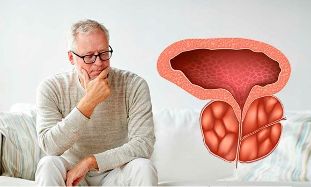Chronic prostatitis – to address the inflammation of the prostate that causes the violation of the morphology and the functioning of the prostate. The chronic prostatitis is manifested prostatic triad – pain in pelvis and genitals, disorders of urination, sexual disorders. The diagnosis of chronic prostatitis includes palpation of the gland, the study of the secretion of the prostate, ultrasonography, uroflowmetry, in, the puncture biopsy of the prostate. When the chronic prostatitis is shown integral medications, physical therapy, prostate massage, instillation of the posterior part of the urethra. The surgical treatment is useful when complicated forms of chronic prostatitis.
Chronic prostatitis

The chronic prostatitis is the most common in men the disease: approximately 50% of men suffer from some type of inflammation of the prostate. Chronic prostatitis most frequently affects men in the age 20 to 40 years of age, are in a period of more sexual, reproductive and labour activity. In this sense, the identification and treatment of chronic prostatitis acquired in urology not only medical, but also social aspect.
Classification of chronic prostatitis
According to the classification of modern prostatitis, prepared in 1995, we distinguish 3 categories of the disease:
- I. Acute prostatitis.
- II. Prostatitis chronic bacterial etiology.
- III. Prostatitis chronic nonbacterial genesis/Syndrome of chronic pelvic pain – simptomokompleks, not associated with obvious signs of infection and in the course of 3 months or more.
- III – chronic prostatitis with the presence of an inflammatory component (detection in the secret of the prostate leukocytes and infectious agents);
- III B – chronic prostatitis with the lack of an inflammatory component (white blood cells and pathogens in the secret of the prostate).
- IV. Chronic prostatitis is asymptomatic (absence of complaints from the detection of leukocytes in prostatic secret).
If you have the infection of a component to speak of bacterial (infectious) chronic prostatitis; in the case of the missing microbial pathogen of nonbacterial (non-contagione) of prostatitis. It is considered that in 90-95% of cases takes place non-bacterial chronic prostatitis, and only 10-5% - bacterial.
The cause of chronic prostatitis

The etiology and pathogenesis of bacterial chronic prostatitis is related to the impact of the infection on the prostate, in the following ways: ascending (through the urethra), descending (at zabrose infection of urine from the bladder), hematogenous (through highways) or lymphogenous (lymphatic collectors). Most uropathogens act and. coli, klebsiella, protey, aureus, enterococci, CORINE, fungi, parasites, and pathogenic viruses. Along with the non-specific flora the development of the chronic prostatitis can participate in the causative agents specific urethritis (chlamydia, mikoplazmi, the gonococcus, trichomonas, Gardnerella).
However, for the development of the chronic prostatitis is important is not so much the presence and activity of the microorganisms, how the state of the organs of the pelvis and the circulation of the blood in them, the presence of comorbidities, the level of protection mechanisms.
Therefore, the occurrence of chronic prostatitis, can contribute to a number of factors. First of all, this of urological diseases –pyelonephritis, cystitis, urethritis, stricture of the urethra, increatos until the end of the acute prostatitis, orchitis, epididymitis and other Microbial etiologist can fall into the prostate, away from the foci of infection, for example, if you have a sinus infection, tonsillitis, tooth decay, chronic bronchitis, pneumonia, pyoderma etc, predispose to the emergence of hronizatsii of the local inflammation and the total of hypothermia, overheating, stay in a moist environment, fatigue, the malnutrition, the rare urination, etc
Non-bacterial chronic prostatitis is usually associated with congestive (standing) the phenomena of the prostate, derived from the venous stasis of the circulation of the blood in the organs of the pelvis and the violation of drainage acini of the prostate. Local obstructio causes an overflow of the vessels of the prostate of the blood, inflammation of incomplete emptying of secrecy, violation of the barrier, secretory, motor, contractile function of the gland.
Stuck changes, usually, are behavioral factors – long sexual lack, the practice of the interruption or slow-release of sex acts, an excess of sexual activity, physical inactivity, the length of the seat, chronic intoxications (alcohol, nicotine, drugs), professional risk (vibration). The development of nonbacterial chronic prostatitis predisposing to pathology of the organs of the pelvis and the nerve structures that perform their innervation (for example, a lesion of the spinal cord), adenoma of the prostate, hemorrhoids, constipation, androgenodeficiency, and other causes.
The symptoms of chronic prostatitis
The chronic prostatitis is manifested by local and general sintomatologa. To local manifestations referred to prostatic of the triad, which is characterized by pain, dysuria, and sexual dysfunction. The chronic pain of prostatitis are permanent the pain of the nature, are located in the area of perineal, genital, above the pubic bone, in the groin. Syndrome pain intensifies at the beginning and at the end of urination, when this pain is radiated to the glans of the penis, the scrotum, the sacrum, the rectum. Sensation of pain may increase after sexual intercourse or in connection with the long duration of abstinence; to reduce or eliminated after an orgasm, each more intense directly at the time of ejaculation.
The intensity of the pain syndrome when chronic prostatitis varies from one of the sensations of discomfort before expressed, to violate sleep, and performance, of the demonstrations. Pain with the difficulty of localization in the sacrum, often referred to as the osteochondrosis or radiculitis, in connection with which the patient continues to can be treated independently, without the need to resort to the assistance of a medical doctor.

Urination in prostatitis the learning and painful. You can feel the difficulty of starting miscet, the weakening or intermittent stream of urine, sensation of incomplete emptying of the bladder, frequent nighttime urgency, burning sensation in the urethra. In the urine in the chronic prostatitis can detect the presence of the floating of the threads. After defecation or the physical burden of the urethra appear selection , due to the decrease of the tone of the prostate. When the chronic prostatitis can be noted the emergence of itching, cold feeling, or the excess sweating in the crotch area, the local changes of the skin coloration associated with the stagnation of the circulation of the blood.
Chronic prostatitis is accompanied by violations of the sexual function. The phenomenon of gipotenzia could result in an impairment, the pain of prolonged erections and frequent nocturnal erections, difficulty or premature ejaculation, loss of sexual desire (decreased libido), deleted orgasms, Hematospermias, of sterility. Sexual disorders always difficult experienced man, leading to psycho-emotional disorders, to neurosis and depression, further worsening of the sexual function.
The exacerbation of the chronic prostatitis accompanied by a slight increase in body temperature and deterioration of health. The general state of the of chronic prostatitis is characterized by increased irritability, apathy, anxiety, rapid fatigue, loss of appetite, sleep disorders, decreased work ability, creativity and physical activity.
Almost a quarter of patients with chronic prostatitis the symptoms of the disease for a long time do not exist, which leads to the late conversion to a urologist. Long-term chronic prostatitis can be impotence, vesiculitis, epididymoorchitis, male infertility, incontinence of urine, the education of the stones and the cysts of the prostate gland, sclerosis of the prostate, the development of adenomas and cancer of the prostate.
The diagnosis of chronic prostatitis
Necessary for the diagnosis of chronic prostatitis, the information is obtained by the integral of laboratory-instrumental survey. Initial evaluation if there is suspicion of chronic prostatitis examines the medical history and complaints, the completion of the physical examination of the genitalia for secretions, rashes, irritations, digital rectal exam of the prostate in order to determine the contours of the borders, the consistency, the pain of the breast.
To determine the structural and functional changes of the prostate shows the performance of the ultrasound of the prostate (TRUS). As important as the techniques in the diagnosis of chronic prostatitis suitable for the study of the secretion of the prostate, a general analysis of urine, research bacteriological of the stroke of the urethra and of urine, 3 glasses of urine samples, pcr, and the REEF of study scraping on the pathogens of sexual infections, the determination of prostate specific antigen (PSA).
Clinically significant when the chronic prostatitis is used to identify in the analysis of the stimulants chlamydia, mycoplasmosis, herpes, cytomegalovirus, trichomoniasis, gonorrhea, candidiasis, and non-specific bacterial flora. The fence of the secretion of the prostate for the research pass after urination, and of the realization of the massage of the prostate. Symptoms of chronic prostatitis, serve to increase the number of leukocytes in the field of vision, decreased amount of lecithin grains, the presence of pathogens in the intestinal flora.
In general, the analysis of the urine when the chronic prostatitis may produce pyuria, pyuria, erythrocyturia. Bacteriological seeding of the urine allows to detect the degree and the nature of bacteriuria. When reproductive of the violations of the study sample spermogrammi and the SEA test.
The degree and the causes of the violation of urination to help determine urodinamicheskie investigations (uroflowmetry, cystometry, profilometry, electromyography). With the research data of the chronic prostatitis can be differentiated from stress incontinence of urine, neurogenic bladder, and etc., hematuria, Hematospermias, obstructive urination shows the endoscopic examination - urethroscopy, tsistoskopiya. To the exclusion of adenomas and prostate cancer requires the definition of a DOG, in some cases, to the realization of the prostate biopsy with morphological study of tissues.

The treatment of chronic prostatitis
The chronic prostatitis is incurable is not easy, however, you must remember that recovery is possible and depends largely on the attitude of the patient, the timeliness of his conversion to the specialist, the definition of compliance with all the requirements of the urologist. The basis of the treatment of the chronic prostatitis is the bacterial antimicrobial therapy according to cialis duration of not less than 2 weeks. To reduce the pain and inflammation are assigned to nsaids ; for the relaxation of the muscles of the prostate, of the recovery of urodinamiki and the reflux of the prostate secret is shown the reception of a-adrenoblockers.
In order to improve the drainage of the prostate gland, of the local microcirculation and muscle tone you done a course of treatment of prostate massage. A session of massage of the prostate should end with the assignment of at least 4 drops of the secretion of the prostate. Prostate massage is contraindicated during acute bacterial prostatitis, prostate abscess, hemorrhoids, stones of the prostate gland, fissures of the rectum, benign prostatic hyperplasia and prostate cancer.
To relieve the pain syndrome when chronic prostatitis can be recommended paraprostatic lock, iglorefleksoterapija. The importance in the treatment of chronic prostatitis relegated from the physical therapy with the designation of a medicinal electrophoresis, ultrasound, phonophoresis, electrical, laser magneticam illic, inductometer, the mud, the smt, the more hot seat bath temperature of 40 – 45°C, enemas with hydrosulphuric and mineral waters, in the instillation of the urethra.
During the development of complications related to chronic prostatitis, it is indicated the surgical treatment: solution of stricture of the urethra; the TOUR of the prostate or prostatectomy to the sclerosis of the prostate; transurethral resection of the bladder to the sclerosis of his neck, puncture and drainage of cysts and abscesses of the prostate; circumcisio when phimosis the recurrent urinary tract infections, etc
The prevention of chronic prostatitis
The warning of the chronic prostatitis requires the observance of reproductive health, in the timing of the therapy of the complex and extragenital infections, the normalization of the regularity of the sexual life, sufficient physical activity, prevent constipation, time to empty the bladder.
To the exclusion of recurrence of chronic prostatitis are necessary dynamic tests andrologist (urologist); prevention courses physiotherapy, multivitamins, immune modulators; the exclusion of hypothermia, excess of temperature, stress, bad habits.


























